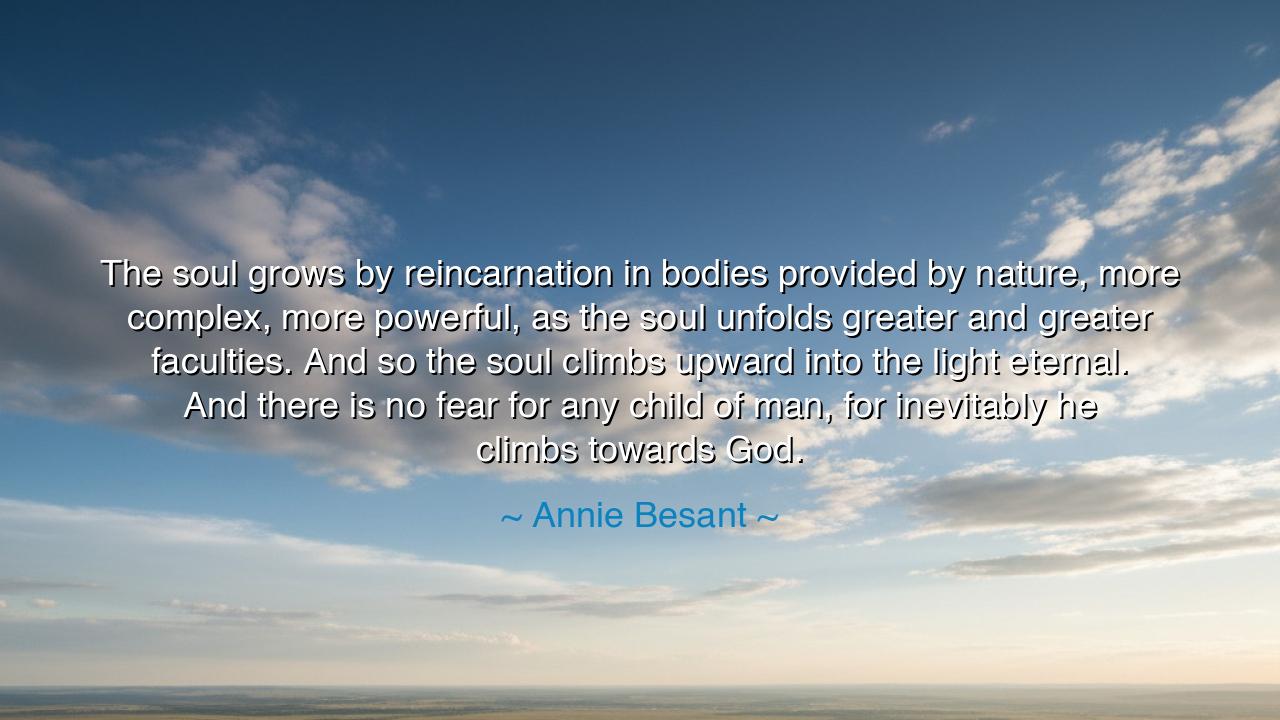
The soul grows by reincarnation in bodies provided by nature
The soul grows by reincarnation in bodies provided by nature, more complex, more powerful, as the soul unfolds greater and greater faculties. And so the soul climbs upward into the light eternal. And there is no fear for any child of man, for inevitably he climbs towards God.






Annie Besant, the theosophist, philosopher, and champion of the human spirit, once declared: “The soul grows by reincarnation in bodies provided by nature, more complex, more powerful, as the soul unfolds greater and greater faculties. And so the soul climbs upward into the light eternal. And there is no fear for any child of man, for inevitably he climbs towards God.” In this utterance she gives voice to a vision of human destiny not bound by a single life, but stretched across ages, guided always by the law of growth and the pull of the divine.
The origin of this thought rests in the Theosophical movement, which Besant helped lead in the late nineteenth and early twentieth centuries. In this tradition, the soul is seen as eternal, journeying through many incarnations, each life a step on the ladder of consciousness. Nature, in her wisdom, provides the forms—the bodies, the instruments—through which the soul may unfold its hidden faculties. With each passing life, the soul becomes more capable, more radiant, more prepared for union with the light eternal. Besant’s words are therefore not merely mystical speculation, but a proclamation of hope: that no struggle is wasted, no failure final, for all paths lead upward, inevitably, toward God.
This teaching echoes the wisdom of many civilizations. In India’s Upanishads, it is said that the self moves from body to body as one puts on new garments, until at last it awakens to its true identity with the eternal Brahman. In Plato’s philosophy, the soul is immortal and learns through cycles of birth and death until it can behold the Good itself. And in the Christian mystics, though reincarnation is not taught, there is a similar conviction that the soul climbs upward, purified by trials, sanctified by grace, until it enters eternal light. Besant’s words stand in this great chorus, affirming the soul’s divine pilgrimage.
The meaning is deeply emotional and heroic. To believe that the soul grows with each incarnation is to strip away despair, for every pain, every failure, every defeat becomes but a lesson, a chisel shaping the eternal self. Even suffering is not wasted—it is a step upward, a hidden teacher, a reminder that we are more than this present moment. In this vision, man is not a fallen creature doomed to dust, but a child of God ascending slowly toward his true home. There is grandeur in this thought: that we are not trapped in fate, but are beings in motion, destined for light.
History offers us luminous examples of this upward climb. Consider Siddhartha Gautama, who, through many struggles and trials of renunciation, attained enlightenment and became the Buddha. His journey is told as one across many lives, each preparing him for the moment of awakening under the Bodhi tree. Or think of Joan of Arc, a peasant girl who rose to become a warrior of faith and courage, her soul’s strength shining beyond the body’s limits. In such lives we see glimpses of Besant’s vision: the soul unfolding greater faculties, transcending circumstance, moving toward eternal radiance.
The lesson for us is profound: do not fear your present weakness, nor despair in your struggles. For as Besant declares, “there is no fear for any child of man.” The path upward is inevitable. If you stumble in this life, you will rise in the next; if you are limited now, greater faculties await you in the future. What matters is not speed, but direction. Walk faithfully, strive earnestly, and remember always that your destiny is not darkness but the light of God.
Practically, this means living each day as a preparation for greater growth. Cultivate patience, for you are eternal. Embrace compassion, for all others are fellow souls on the same upward climb. Seek wisdom, not for pride, but for the unfolding of the divine spark within you. And when life burdens you with sorrow, hold fast to this truth: nothing is wasted, nothing is lost. Each trial is a rung in the ladder that leads toward eternity.
Thus, Annie Besant’s words endure like a hymn to the human spirit: limited in body, yet infinite in destiny; bound to earth, yet heir of heaven; stumbling in time, yet destined for eternity. Let us take courage, then, and live nobly, for we are all climbing—slowly, surely, gloriously—toward God.






AAdministratorAdministrator
Welcome, honored guests. Please leave a comment, we will respond soon